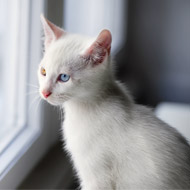
Charity needs feline participants to help with deafness study
The Animal Health Trust (AHT) are calling for litters of white kittens to help further knowledge about how many white cats are born deaf.
Animals with a predominantly white coat are more prone to deafness, however the genetics behind the phenomenon is still unclear.
The study by the Animal Heath Trust aims to better understand why congenital deafness in white kittens and their litter mates in the UK is so common, and will be a basis to further investigate the genetic heritability and genetic defects behind the disease in white cats in future.
The study will focus on four breeds: Norwegian Forest, British shorthair, Russian and Turkish Vankedisi. Breeders will be offered a free BAER (Brainstem Auditory Evoked Respose) hearing test for the entire litter of kittens, as long as at least one of the litter is completely white. The kittens must be between the ages of nine and 13 weeks old to take part. It is also desirable, but not essential, if the sire and dam's eye colour, coat colour and hearing ability can also be provided to help aid the investigation.
The test will be carried out at the AHTs headquarters near Newmarket by a fully trained neurology technician. The AHT say that the test is simple, straightforward, and generally does not require sedation. The test will monitor the kitten's brain response to a series of clicks to establish whether the kitten hears normally, or is deaf in one or both ears. Each kitten will receive an official BAER hearing test certificate stating the results.
Lorenzo Mari, a neurology resident at the AHT involved in this study, said: “It’s relatively well-known that white cats are more likely to be born deaf, but there is still a lot to understand about the genetics behind this phenomenon. Currently, the best thing breeders can do is to have litters routinely hearing tested as kittens and to de-select those diagnosed as congenitally deaf from further breeding.
“We want to be able to do more to combat this condition in white cats and to, hopefully, make greater steps towards breeding out the genes causing this condition altogether. It will be a very long process, but obtaining as much information as possible from this study will greatly improve our understanding of this disorder - and therefore increase the chance that fewer cats will be born deaf in the future. Ideally we need to see 30 more litters to complete the study, so we really want to hear from anyone who would be able to help us!”
For more information please contact, lorenzo.mari@aht.org.uk or julia.freeman@aht.org.uk of the Neurology Department or call, 01638 552 700.



 The Veterinary Medicines Directorate (VMD) is inviting applications from veterinary students to attend a one-week extramural studies (EMS) placement in July 2026.
The Veterinary Medicines Directorate (VMD) is inviting applications from veterinary students to attend a one-week extramural studies (EMS) placement in July 2026.